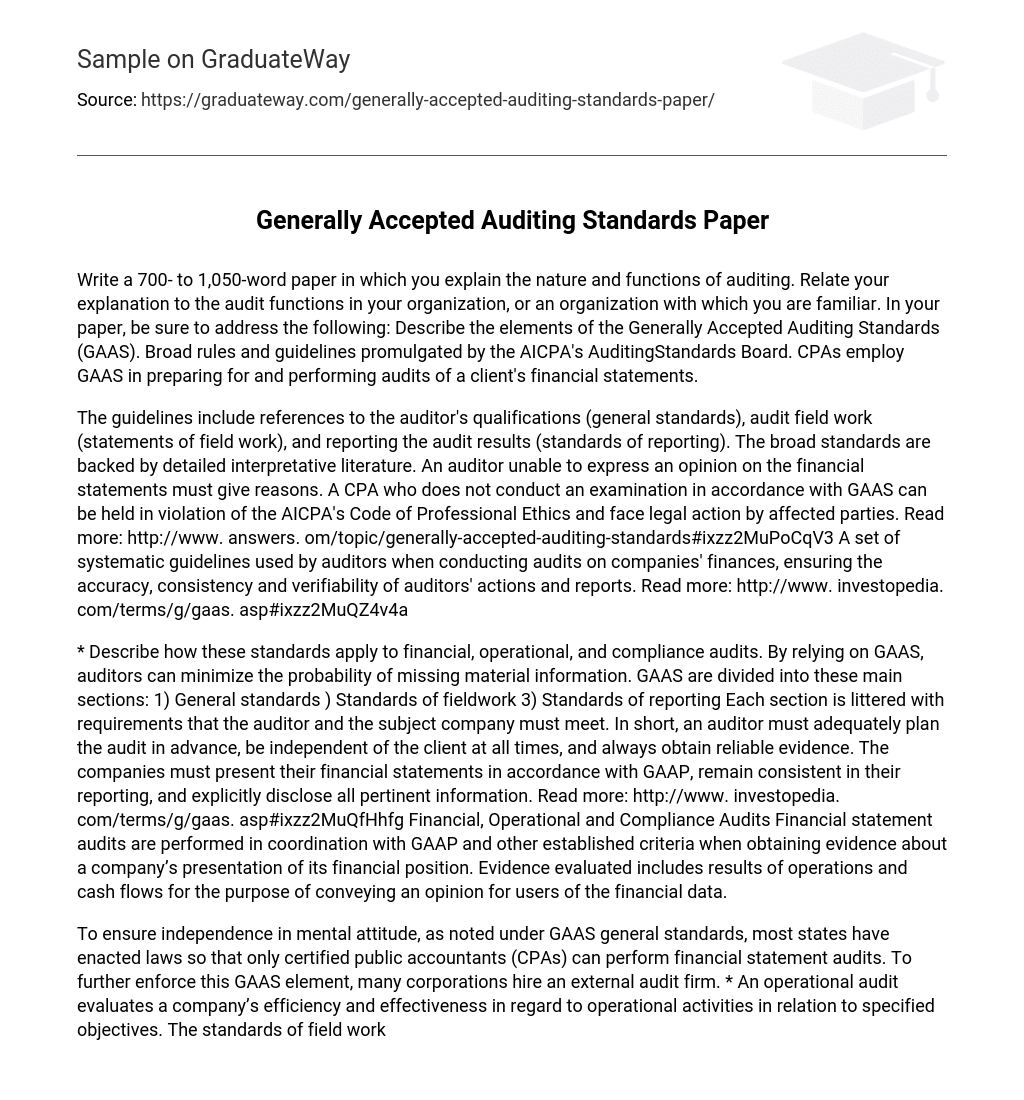Write a 700- to 1,050-word paper in which you explain the nature and functions of auditing and relate it to the audit functions in your organization, or an organization with which you are familiar. In your paper, address the following: Describe the elements of the Generally Accepted Auditing Standards (GAAS), which are broad rules and guidelines promulgated by the AICPA’s Auditing Standards Board. GAAS is employed by CPAs in preparing for and performing audits of a client’s financial statements.
The Generally Accepted Auditing Standards (GAAS) consist of systematic guidelines utilized by auditors to conduct financial audits on companies. These standards ensure the accuracy, consistency, and verifiability of the auditors’ actions and reports. GAAS covers requirements for auditor qualifications, field work involved in audits, and reporting of audit results. If an auditor cannot express an opinion on financial statements, they must provide reasons for their inability to do so. Failure to adhere to GAAS may result in a violation of the AICPA’s Code of Professional Ethics and potentially lead to legal action from parties affected by the audit.
The application of these standards to financial, operational, and compliance audits is described. By relying on GAAS, auditors can reduce the chance of missing important information. GAAS is divided into three main sections: 1) General standards, 2) Standards of fieldwork, and 3) Standards of reporting. Each section contains requirements that both auditors and the subject company must meet. In summary, auditors must plan the audit adequately in advance, maintain independence from the client at all times, and gather reliable evidence. The companies must present their financial statements in accordance with GAAP, follow consistent reporting practices, and disclose all relevant information. Read more Financial, Operational and Compliance Audits Financial statement audits are performed using GAAP and other established criteria to obtain evidence about a company’s financial position. The evidence evaluated includes results of operations and cash flows in order to provide an opinion for users of the financial data.
To maintain a mindset of independence, as stated in the GAAS general standards, most states have implemented legislation that restricts financial statement audits to certified public accountants (CPAs). Corporations often engage the services of an external audit firm to uphold this GAAS requirement.
An operational audit appraises a company’s operational activities, evaluating their efficiency and effectiveness in meeting specific objectives. The standards of field work in auditing hold significant importance in operational audits. The auditor’s efficiency and effectiveness reports, along with their recommendations for improvement, are given great consideration.
A compliance audit examines whether a company adheres to regulations and guidelines concerning its financial and operational activities.
The Sarbanes-Oxley Act of 2002 necessitates a dual-purpose audit for companies, serving as evidence for GAAS reporting standards and the requirement for an effective internal control system over financial reporting. This act, along with the PCAOB, will have an impact on audits of publicly traded companies.
The Sarbanes-Oxley Act (SOX) and the Public Company Accounting Oversight Board have a profound influence on auditors’ job performance. Auditors are obligated to adhere to precise procedures for obtaining evidence for their opinions, as specified by SOX. Moreover, SOX mandates that auditors evaluate the efficiency of internal controls in financial reporting. Consequently, certain auditing methods that were once deemed acceptable are now regarded as unsuitable.
When auditing financial statements, auditors often prioritize performing procedures that are practically important instead of conducting a full test of the controls. After the implementation of the Sarbanes-Oxley Act (SOX), management’s internal control over financial reporting is reported annually, whereas before SOX, this was often done on a cyclical basis. Currently, the Public Company Accounting Oversight Board (PCAOB) has six auditing standards that auditors must comply with.
Auditing conducted under PCAOB Auditing Standard No. ensures a proper evaluation of the consistency of financial statements. This standard impacts today’s auditing procedures by ensuring that auditors correctly identify consistency matters that may impact the report. For instance, if presented with several years of comparative financial statements prepared by different auditors, the successor auditor must evaluate the consistency between their report and the immediately preceding period.
* The Act imposes additional requirements on auditors and mandates the actions of the PCAOB. These requirements include compliance with PCAOB Auditing Standard No. 6, as well as other obligations. Auditors must audit internal controls over financial reporting that is connected with a financial statement audit, and they must also provide detailed documentation to support their conclusions. Moreover, auditors are obligated to report on previously documented materials. Furthermore, SOX prohibits auditing companies from offering non-auditing services.
Due to the need for enhanced regulation of publicly traded corporations, new laws and procedures were implemented to govern both management and auditors. These regulations were influenced by the establishment of criteria by the GAAS, the passing of the SOX act, and the implementation of PCAOB standards. The introduction of these auditing criteria not only helps users of an entity’s financial data make more informed decisions but also restores a sense of confidence that was previously lost due to corporate scandals on Wall Street.





